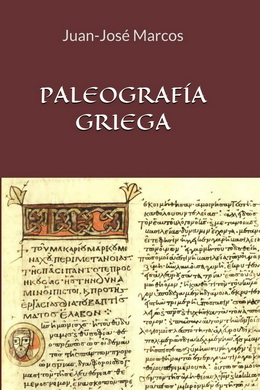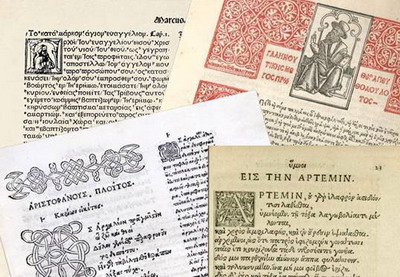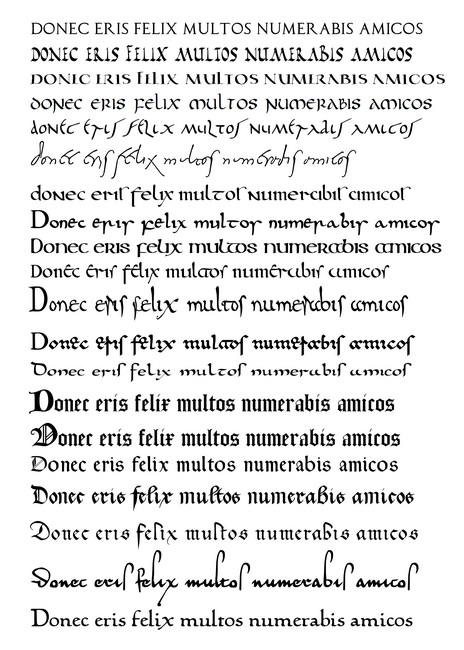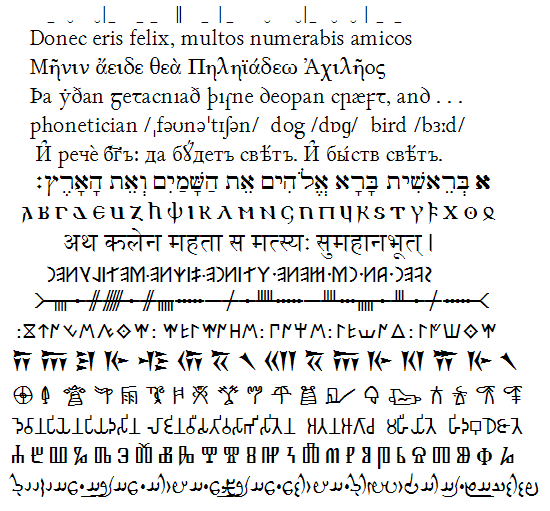|
PALEOGRAPHIC
FONTS FOR ANCIENT GREEK
|

 , BIBLICAL UNCIAL
, BIBLICAL UNCIALProfessor of classical languages.
Plasencia. Spain. January 2026.
INTRODUCTION
These fonts belong to the category known as facsimile level and they are intended to resemble the handwriting style of different Greek scripts as appear in manuscripts.
The paleographic font package is a collection of fonts based on ancient and medieval calligraphy which include specialty characters, abbreviations, ligatures and alternate forms for some letters. These paleographic fonts can be used to represent ancient and medieval manuscripts in a "semi-diplomatic" fashion. That is, an edited version of the manuscript that preserves more features of the original document than is common in standard, normalized, modern editions. They allow the preservation of many original features, and can be used to help students become more familiar with ancient and medieval writing and languages without the expense of purchasing semi-diplomatic editions or facsimiles of manuscripts.
This collection of fonts is suitable for students and scholars of historical sciences as well as desktop paleographical publishing. It may be of interest to students and professionals dealing with paleography, linguistics and ancient Greek.
Doubtless this is the most authentic and useful of font packages currently available to medievalists.
-----------------------------------------------------------------------------------------------------
The paleographic Greek fonts collection consists of 10 typefaces (Angular Uncial, Biblical Uncial, Coptic Uncial, Papyrus Uncial, Round Uncial, Slavonic Uncial, Sloping Uncial, Minuscule IX, Minuscule XI and Minuscule XV)
A)= Typefaces included in the Uncial class use as a source of their design the different Greek handwriting hands used from around the first century B.C. till the tenth century A.D. approximately.
Here is a brief description of the different typefaces:
1.- Handwriting on papyrus.
ANGULAR UNCIAL is a digital replica of the handwriting employed in the Bacchylides papyrus, now preserved in the British Museum. The only evidence as to the age of the manuscript is that afforded by the handwriting. Guided by this Dr Kenyon assigns the Bacchylides papyrus to the first century B.C.
ROUND UNCIAL is a close resemblance to the hand used in the so-named Hawara Homer, a papyrus (now in the Bodleian Library in Oxford) from the second century A.D containing portions of the second book of the Homer's Iliad.
PAPYRUS UNCIAL closely follows the so-called P66, which is a near complete codex of the Gospel of John and part of the collection known as the "Bodmer Papyri". It is one of the oldest New Testament manuscripts known to exist, with its writing dated to around 200 A.D.
2.- Handwriting on parchment or vellum.
BIBLICAL UNCIAL mimics the hand of the Codex Bezae Cantabrigiensis, a Greek and Latin diglot, which contains the four gospels and the Acts of the Apostles. Following Scrivener, scholars universally dated it from the beginning of the sixth century A.D., but there is a tendency now to place it a hundred years earlier. The Cambridge University Library holds the manuscript.
SLOPING UNCIAL is based on the lettering showed in the Codex Washingtonianus, also called The Freer Gospel, which contains the four biblical gospels and was written on vellum in the 4th or 5th century A.D.
COPTIC UNCIAL reproduces the style of handwriting known as "Coptic", which was used for Greek in some manuscripts such as the Codex Marchalianus (written in Egypt in the sixth century A.D.) or the Codex Vaticanus Borgianus (sixth century A.D.), for example.
SLAVONIC UNCIAL, as its name denotes, imitates the style of handwriting known as "Slavonic", (since the Slavs took most of their alphabet from it). This style represents the late and final development of the Uncial handwriting and was employed in manuscripts like the Codex Boreelianus (ninth century A.D.).
B)= Typefaces which fall within the Minuscule class (MINUSCULE IX, MINUSCULE XI and MINUSCULE XV) imitate the ordinary style of the Byzantine manuscripts, being closer imitations of the different Greek minuscule handwritings used from the ninth to the fifteenth century A.D.
IMPORTANT THINGS TO NOTE: All the fonts are accompanied by their Roman counterpart matching the Greek face as best as possible. See images below.
The fonts are edit-embeddable to permit the creation of Adobe Acrobat documents (PDF) and web pages with embedded fonts (the so-called "web-fonts": EOT, WOFF and SVG formats).
The digital typefaces may be purchased individually or all together. Please read information below.
The fonts are provided in Unicode-encoded TryType or OpenType format. The Windows and Mac versions of the fonts are cross-platform compatible. Therefore they permit direct exchange of all their standard Unicode-encoded characters with any other Unicode font containing those characters on either platform.
The paleographic font package contains the letters, breathing marks, accents and other special characters necessary to reproduce the standard character form text of codices and papyri.
Please note that most of the ancient codices or papyri do not show (display) diacritics at all or seldom rarely, however, because many users may want to type the original hand, but also display the breathing marks and accents, the fonts include these diacritical marks.
Another useful feature is the inclusion of nomina sacra, since the fonts contain extendible overstriking bars for creating titles and abbreviations occurring in most manuscripts.
Hence with these fonts you can type faithful representations of the original hand of important early codices or papyri with Unicode-encoded Greek fonts.
By using these fonts you can type text just as it was originally copied by its scribe.
You can also use them running Linux. I have successfully tried them under Debian with OpenOffice.
These fonts should be usable on Macintosh running OSX 10 or above. This is not a problem, since Mac recognizes PC TrueType/OpenType fonts without complaint.
Some of the fonts contain OpenType features (discretianory ligatures, alternate glyphs, historical forms, stylistic alternates etc.), therefore you will need an application (Word 2010, 2013, 2016, 2019 or 2021, InDesign, QuarkXpress, Mellel, Illustrator, TextEdit, Nisus Writer etc.) which supports and handles the OpenType technology to take advantage of such feautres. See the User's Manual linked below for more details.
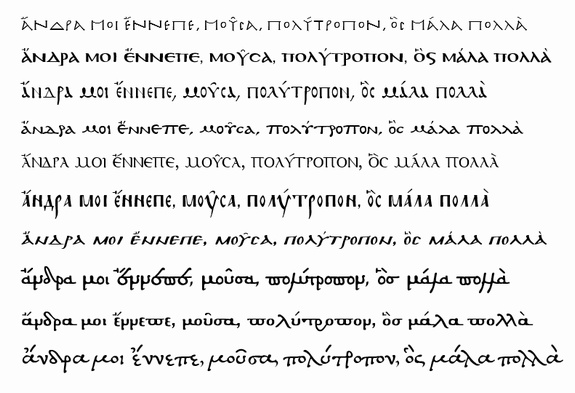
If you wish to save the image, once your browser displays it, right-click on the image and choose Save Image As (or Save Picture As) and save to your computer/network. Note, however, that the images have been reduced in size for use on the web and may not look as good as the printed pages. Therefore, for best quality please download the PDF linked below.

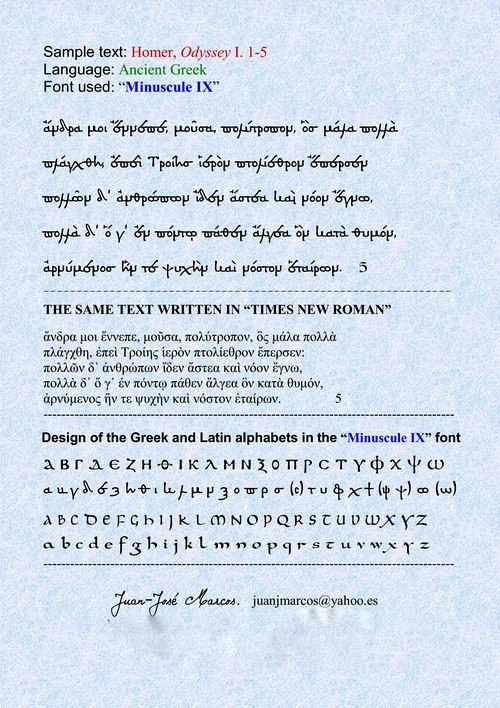
Sample text in "Minuscule IX" font ---
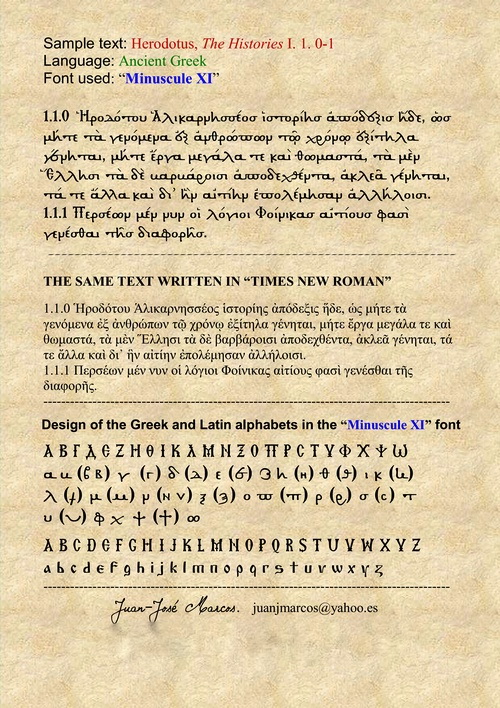
Sample text in "Minuscule XI" font--- 
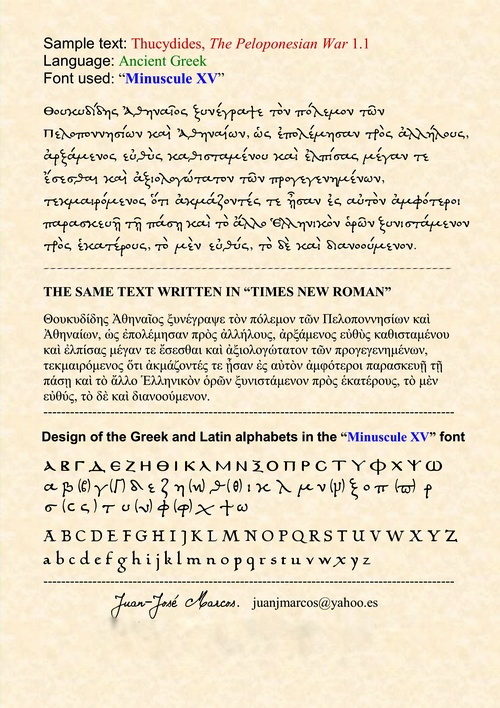
Sample text in "Minuscule XV" font

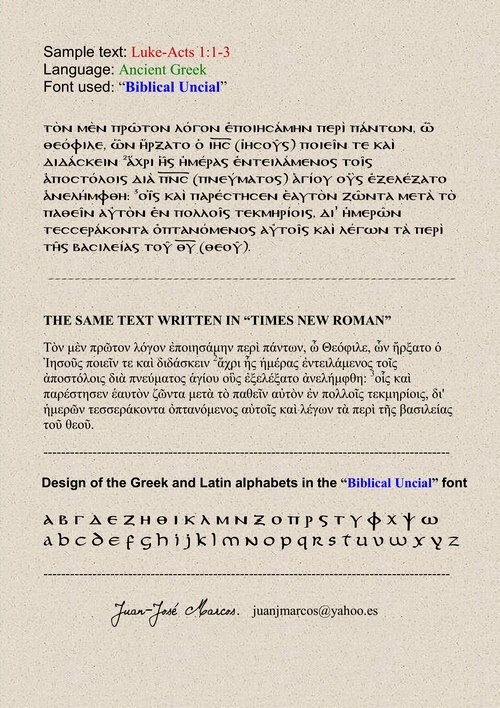
Sample text in "Biblical Uncial" font---- 
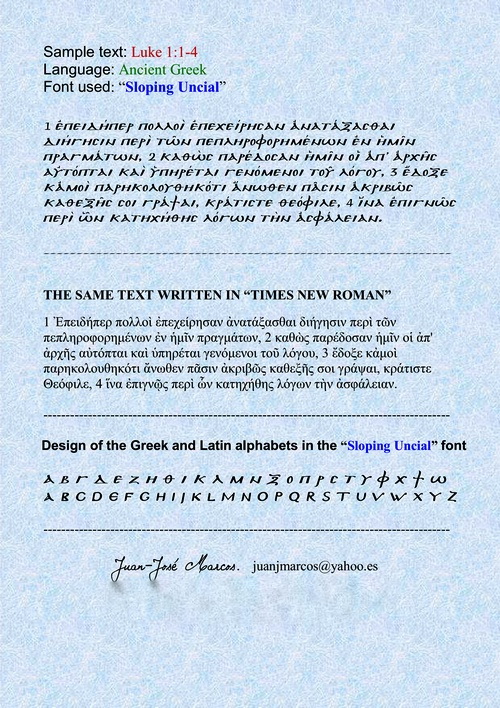
Sample text in "Sloping Uncial" font

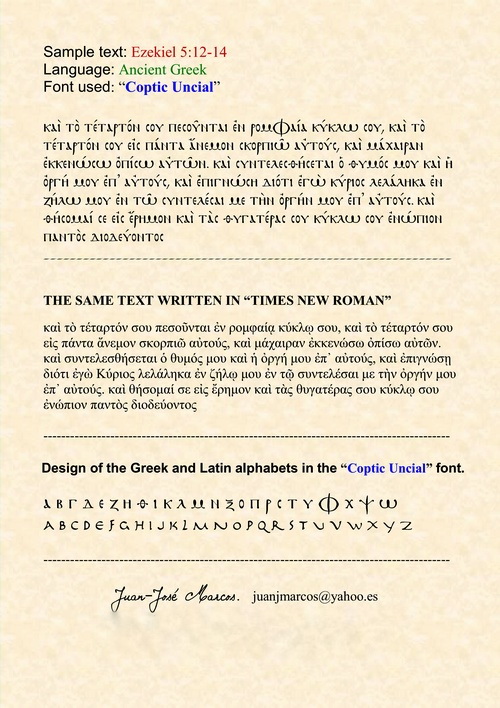
Sample text in "Coptic Uncial" font--


Sample text in "Papyrus Uncial" font--

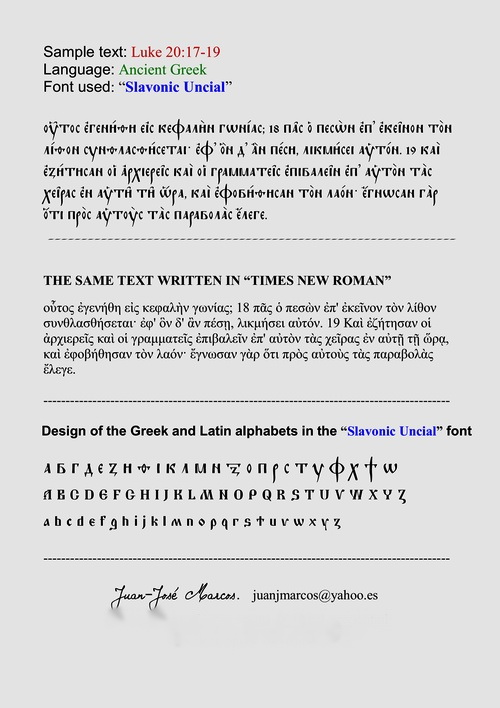
Sample text in "Slavonic Uncial" font

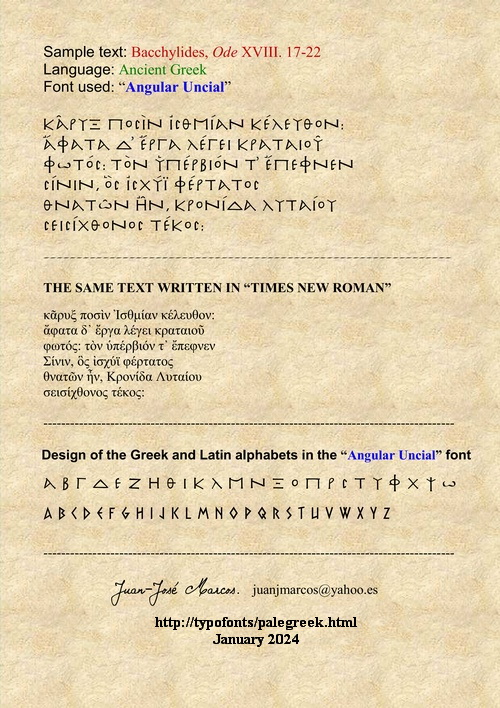
Sample text in "Angular Uncial" font---

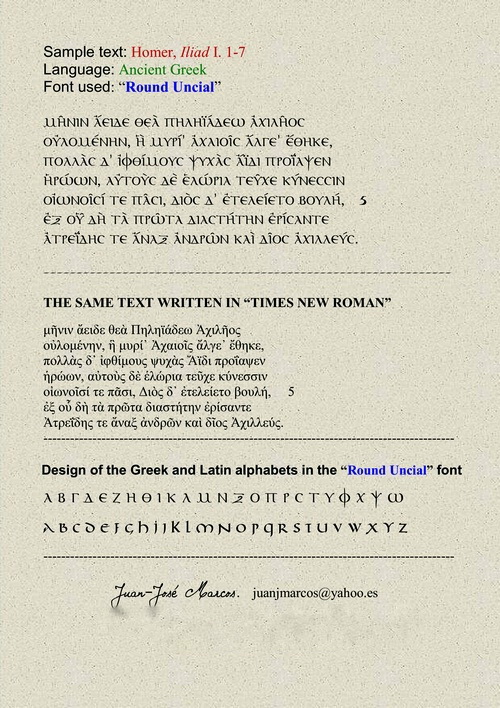
Sample text in "Round Uncial" font
For more details on handwriting Greek systems and further information about these fonts including more visual examples, please read the User's Manual (PDF format, 71 pages) you can download below.
You can see visual samples of these fonts if you read the short manual of Greek Paleography I have written (PDF file with 71 pages profusely illustrated) which is available from this site.
It contains a lot of images of manuscripts and shows the close imitation of their different handwritings I have made with the paleographic set of fonts. The manual also contains detailed explanations about the history of the different handwriting styles used in Greek manuscripts from the 4th century A.D. to the invention of printing with movable type in the middle of the 15th century.
Information about how to manage the OpenType features present in the digital typefaces is also provided.
PRICE OF THE FONT PACKAGE
The font package termed "Fonts for Greek Paleography" is a set of fonts which contains a total of 10 typefaces: Angular Uncial, Biblical Uncial, Coptic Uncial, Papyrus Uncial, Round Uncial, Slavonic Uncial, Sloping Uncial, Minuscule IX, Minuscule XI and Minuscule XV) respectively.
These fonts based on historical prototypes are the result of long hours of investigation and hard work.
Font development is a painstaking, time-consuming task and this is a single person's work not sponsored by any institution.
Hence these fonts are not free. Nevertheless, the font package has a reasonable price.
Registration costs €100 (approximately US $115 or £85)* (see advise below)
If you wish, you can purchase only one individual font as well. Each single font costs €20 (approximately US $23 or £17).
SPECIAL PRICING: Pay two fonts and get three. Purchase three fonts for €40 (approximately US $46). If you acquire two fonts, the third is for free. A 33% discount!
It is also available a font package of five fonts for €60 (approximately US $69). A 50% discount!
After making the payment you will receive the fonts as attachment to an email message sent to your email account.
*ADVISE: Due to the current fluctuation in the exchange rate among different currencies, only prices in Euro can be guaranteed. The prices in US$ or in other currencies depend on the actual exchange rate (for example at the date of this writing, January 2026, 1 euro is equivalent to 1,15 US dollars approximately).
This payment is being backed by PayPal®, a global leader in online payment solutions. To make payments with PapyPal is easy, fast, free and secure for buyers. Naturally, your transaction will be confidential and the information you give will not be used for any reason other than the use intended. PayPal protects your security.
(Note: You are not required to have a Paypal account. By following the instructions on the Paypal page, you may make your payment by credit card or bank transfer.)

Do not worry about converting the Euro price into your currency, PayPal will do this when you make your payment.
Depending on your choice, click on the corresponding button below to purchase the paleographic fonts online. In order to avoid errors, please read carefully the information given below before clicking on the PayPal button to order. Please be careful with your choosing since depending on it you will get one item or other.
1) – One single font. Delivery: Electronic only. Each individual font costs €20 (approximately US $22 or £17). The font will be sent as attachment to your email account. If you choose this option, please email me telling the name of the font you wish to receive.
Take advantage of our special pricing options:
2a) – Three fonts. Delivery: Electronic only. SPECIAL PRICE: Pay two fonts and get three. Purchase three fonts for €40 (approximately US $44). If you acquire two fonts, the third is for free. A 33% discount! Evidently if you choose this option, you must email me telling the name of the fonts you wish to receive.
2b) – Five fonts. Delivery: Electronic only. SPECIAL OFFER: Purchase five fonts for €60 (approximately $72 or £51). Only €12 (approximately US $14) for each font. You save 45%. A real bargain! Evidently if you choose this option, you must email me indicating the name of the fonts you wish to receive.
3) – Complete font package of 10 fonts. Delivery: Electronic. The full package of 10 fonts costs €100 (approximately US $110 or £85). The package which contains the ten paleographic fonts will be sent as attachment to your email account in a ZIP file. The fonts have not restrictions at all. All features are enabled. Even embedding is allowed: this means that the font may be embedded in documents to produce PDF documents running Adobe Acrobat. You also are entitled to use the font in a printed book or to produce electronic documents which can be uploaded into your web page.
IMPORTANT THINGS TO NOTE :
1.- Whatever option you choose, please send me a message after making the payment through PayPal in order to confirm that you are really who ordered the font.
2.- In most cases I will reply to your message in due time (normally within a day or so), unless I was on holydays, then it will take a little more time, since I only will able to check my emails from time to time, (usually every five days, more or less or even a little more during the summer) so be patient, however, be sure that you will receive my response. Sorry for this inconvenience.
3.- Evidently, any modification or public distribution of these fonts is not permited under any circumstance.
4.- For other alternative methods of payment (bank transfer, postal order etc), please email me for further details.
SUGGESTIONS AND QUERIES
Although you do not purchase the fonts, please, send me comments, suggestions for improvements or anything else regarding my paleographical fonts. I would like to know your opinion about my work.
I really would appreciate having users' feedback.
Such reaction from users will be the deciding factor in my decision of carrying on with the development of more paleographic fonts. Any errors in the manual? Please do not hesitate to contact me. Your comments will be welcome. Thanks in advance.
If this set of fonts is well received, it will be expanded in the near future.
Those readers interested in reading a true treatise on Greek Paleography can find useful my book entitled "PALEOGRAFÍA GRIEGA: Manual ilustrado" (in Spanish), 550 pages containing more than 100 images, published by KDP AMAZON, December 2018. More information about this book HERE where you can download a wide excerpt (260 pages).
Information in the AMAZON site: https://www.amazon.es/dp/1790291771
You can have a look inside this book (PDF hosted on Academia.edu server) by clicking on the following link or on the image below:
https://www.academia.edu/PALEOGRAFIA_GRIEGA
Those readers interested in knowing about the origin and development of Greek typefaces will find useful to read my e-book entitled “History of Greek Typography: from the invention of printing to the Digital Age” (440 pages profusely illustrated with lots of images of Greek books printed by Demetrius Damilas, Bonus Acursius, Aldus Manutius, Zacharias Callierges, Janus Lascaris, Froben, Guilles de Gourmont, Simon de Colines, Plantin, Robert Estienne, the Elzevirs, the Foulis brothers, Savile, Caslon, Baskerville, Didot, Bodoni, Goeschen, Richard Porson, Watts, Hibbert, Selwyn Image, etc.).
“History of Greek Typography: from the invention of printing to the Digital Age” follows the history and development of Greek printing types and their role in the history of the printed word and civilization.
The book explores every major development in the design of Greek type and includes some lesser-known designers whose type designs made significant contributions to the craft. The material is divided into sections by historical period for easy reference.
The text of the book provides an excellent historical background to the study of Greek printing types.
“History of Greek Typography" stands a step above other books on the history of Greek printing types because of the number of its reproductions -some of them extremely rare- and its straightforward and clear exposition.
This work, profusely illustrated, not only addresses the Hellenic scholar, but also the modern writer, typographer, historian, graphic designer, printer, publisher and font developer. For more detailed information click HERE or the image below.
A similar font collection for Latin Paleography (Capitalis elegans, capitalis rustica, uncialis, semiuncialis, cursiva romana antiqua, merovingia, insularis majuscula, insularis minuscula, visigothica, beneventana, carolina minuscula, gothica textura prescissa, gothica textura quadrata, gothica rotunda, gothica bastarda, gothica notularis and humanistica antiqua) is also available. For more detailed information press HERE or click on the image below.
If you wish to use a specialized multilingual
Unicode font specifically designed for classical languages (classical
& medieval Latin, ancient
Greek, Coptic, Linear B, Etruscan, Oscan, Umbrian, Faliscan, Messapic, Picene, Iberian, Celtiberian, Gothic, Runic, Old & Middle English, Hebrew, Sanskrit, Ogham, Ugaritic, Old Persian, Phoenician, Karosthi, Old Nordic and Linguistics (I.P.A.), please visit the ALPHABETUM website , there
you will find further information about the Unicode system and the wide
coverage and capabilities of this large Unicode font.
Juan-José Marcos
Plasencia (Cáceres) Spain.
This page last updated on January 2026
